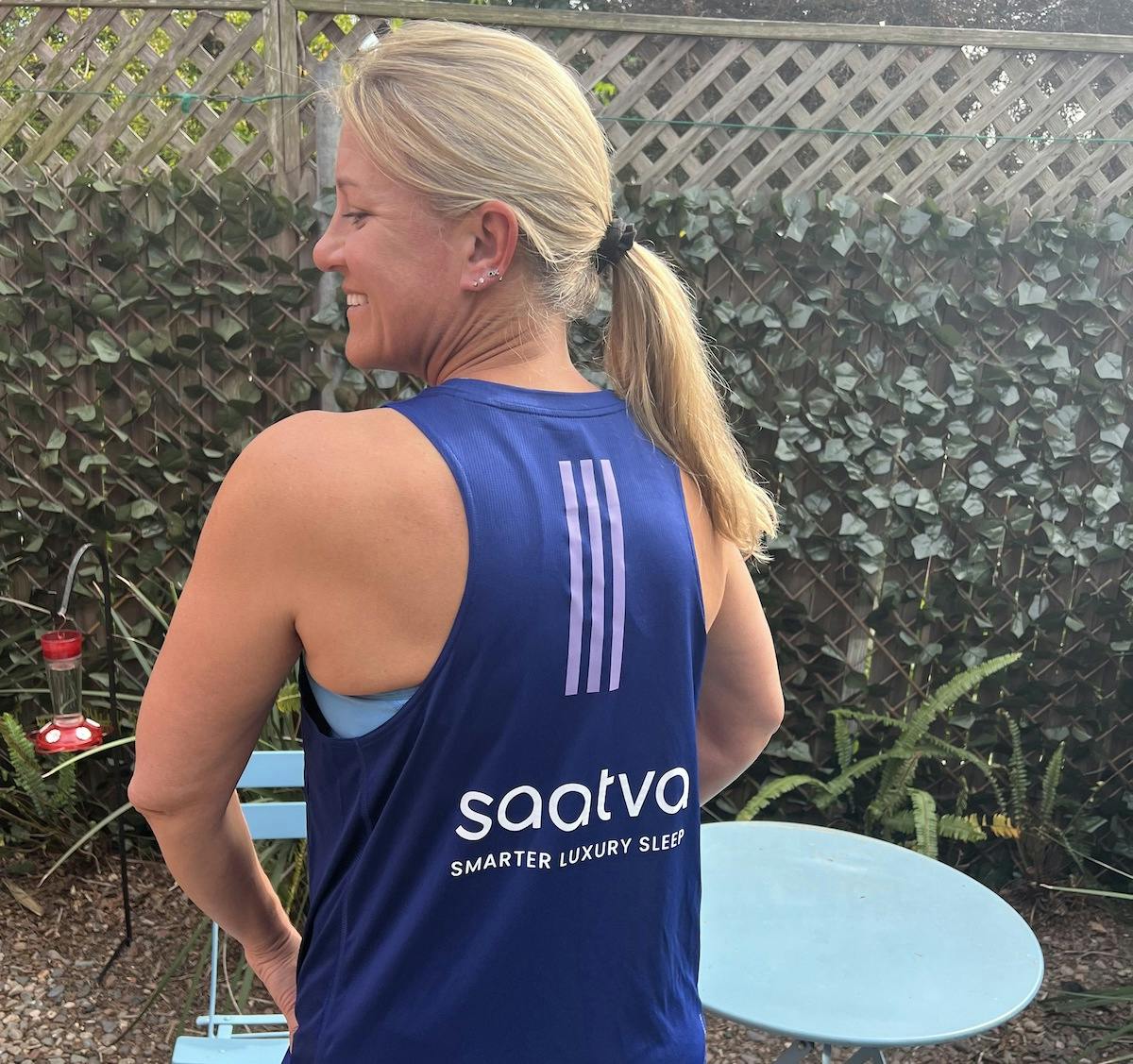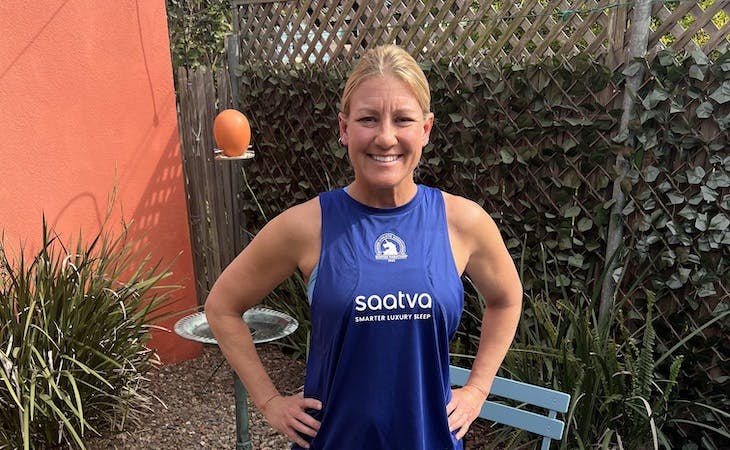Wendy Haase is no stranger to the Boston Marathon. She’s competed in the popular long-distance race four times and is gearing up to run again this April. This marks the 24th marathon overall for Haase (impressive!), who started running marathons in 2005.
Haase is running the 2022 Boston Marathon on April 18 on behalf of Saatva and the Boston chapter of the National MS Society—and we got to chat with her ahead of the race. Read our Q&A with Haase below to find out how she’s prepping for the big day, learn what her nighttime routine looks like, and get her best sleep tips for athletes.
Q: How does sleep affect your performance as a runner?
A: Sleeping is one of the most important things. When you get a good night’s sleep, you allow your body to heal. All of the strain you put on your muscles is being taken care of naturally while you sleep. It also affects your attitude. It’s so much easier to get out of bed at 5 o’clock in the morning when you’ve had a restful sleep. It’s key.

Q: What does your nighttime routine look like?
A: I fall asleep fairly easily, but my biggest challenge is turning my brain off. If I get up in the middle of the night—whether it’s to use the bathroom or get a drink of water—my mind starts thinking about my workday and the things I need to accomplish. One thing that’s been helpful for me is using Bose Sleepbuds. You can listen to white noise, which helps drown out that chatter in your head.
Q: How do you balance training, having a social life, and getting a good night’s sleep?
A: It’s about being consistent and trying to go to bed at the same time every night and getting a good amount of sleep. Whether that’s six or eight hours depends on your own body. For me, it’s about seven to eight hours.
As for balancing my social life, if I know I’m going to be out, I adjust my training schedule. For example, if I know that I’m going to be out on a Saturday night after my 9 p.m. bedtime, I’ll do my long run on Saturday morning versus Sunday morning.
It’s also about eating properly. You want to have a decent meal before long runs so you can be fueled. At this stage of my life, I can’t be filled on pizza, unfortunately.
Q: Speaking of food, what do you eat while you’re training for a marathon? What do you avoid?
A: I try to eat healthily: vegetables and protein. I watch alcohol, unnecessary fats, and greasy foods. I’m more conscientious about my diet while I’m training—especially in the last couple of weeks leading up to the race. Overall, I’m a pretty healthy eater to begin with, so it’s not too big of a change.
Q: You live in California. How do you plan on dealing with jet lag from traveling to the east coast for the Boston Marathon?
A: As an amateur runner, I’ll be arriving on Saturday, April 16, and the race is on Monday. I’ll have a good day to acclimate. The unique thing about the Boston Marathon is that it doesn’t start until 10 a.m. Even though I have to be at the bus pickup at 8:15 a.m. EST, that’s 5:15 a.m. PST, which is usually when I’m getting up to go for a run. Luckily, it’s not too drastic.
Q: How do you make your hotel feel more like home when traveling for a race?
A: Temperature control is important. And if I’m going on a road trip, I’ll bring my pillow with me because pillows at hotels can sometimes be uncomfortable. I also have a pillow that’s fitted for between my knees, which I bring with me whenever I travel.
Q: How do you handle pre-race jitters the night before a race?
A: I think whether you’ve run 23 marathons or this is your first one, there are always jitters before a race. You just have to mentally calm yourself—you have to think of all the worst-case scenarios and how you would deal with them to put your mind at ease.
But chances are, you’re not going to sleep well the night before a race, so you have to get good sleep two nights before. That’s what’s important. There’s a lot of adrenaline that plays into things on race day, so you forget that you only slept five hours the night before because you were tossing and turning.
“Whether you’ve run 23 marathons or this is your first one, there are always jitters before a race. You just have to mentally calm yourself—you have to think of all the worst-case scenarios and how you would deal with them to put your mind at ease.”
Q: What does your sleep routine look like after you get done competing in a marathon?
A: 20-minute naps are amazing. They let your body rest and regroup. Your body needs time to recover from what you’ve just put it through. It’s usually two days after a race when you really feel the aches and pains, so it’s important to continue resting and listening to your body.
Q: Finally, what advice do you have for someone who’s running their first marathon?
A: The first thing is don’t underestimate the power of sleep. Your body needs sleep. So, listen to your body. There are going to be days when you’re supposed to get up at 5 a.m. to run. You may need to push that off to an afternoon run because you need to sleep in. You should also trust your training. Everyone has advice on what might work, but what works for me may not work for someone else.
I also suggest being cautious of who you share a room with if you’re traveling to a race with friends. Do they snore? And if they’re not racing, will they be staying up later than you? Be conscientious about who you’re sharing a room with so you can make sure you’re able to get some rest before the big day.
Sleep tips for athletes
For more sleep tips for athletes, check out the following articles we put together:
- 6 Best Sleep Tips for Runners
- 7 Best Sleep Tips for Triathletes
- A Professional Sports Trainer’s Top Sleep Tips
- A Pro Football Player Shares His Winning Sleep Tips
- How to Sleep Like an Olympic Athlete
- The Best Mattress for Athletes
Photos courtesy of Wendy Haase




